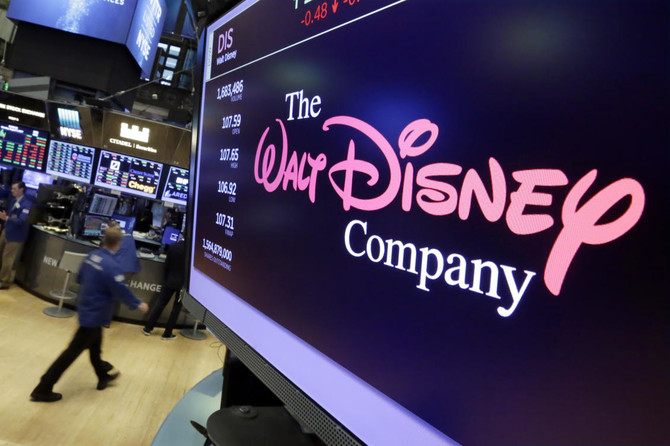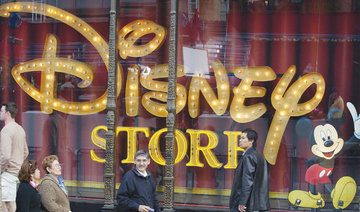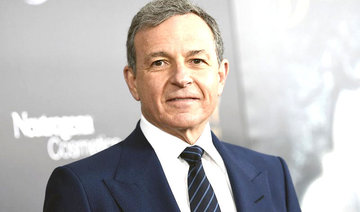MENLO PARK, California: The coming union of the Disney and Fox media empires is set to create a new nirvana for fanboys and -girls, one that reunites superheroes and sci-fi characters long separated by an energy barrier of corporate legalism.
Take, for instance, the fractured world of Marvel superheroes. For years, the X-Men (Wolverine, Storm, Professor X and the crew) and the Fantastic Four (Thing, Invisible Woman, et al) have battled bad dudes from the studios of 20th Century Fox. Meanwhile Iron Man, Black Widow and other Avengers vanquished villains in another corner of the galaxy run by Disney. Almost ne’er the twain did meet — though that could soon change.
In a related fashion, rights to the various “Star Wars” films have been scattered all over a galaxy far, far away; those will soon be unified under a powerful Galactic Emp– er, well, Magic Kingdom.
Disney’s announcement Thursday that it’s buying most of movie goliath Fox for $52.4 billion in stock brings these once disparate franchises together, possibly for as-yet unplanned intergalactic dust-ups. Add the “Avatar” franchise to the blockbuster mix, and the company that launched Mickey Mouse will be an unavoidable presence at the box office and online if the deal goes through.
The combined company will account for more than a third of theatrical revenues in the US and Canada, an $11 billion business last year, not to mention a huge chunk of the global theater-going pie, according to Daniel Ives, chief strategy officer at market research firm GBH Insights.
That would make the Disney juggernaut a more powerful theatrical force to be reckoned with than ever before. Online, Disney has announced plans to launch its own streaming service in 2019, after pulling titles like “Rogue One: A Star Wars Story” and Disney’s “Moana” from Netflix’s streaming platform to move onto its own. After Fox’s deal to send its movies to HBO ends reportedly in 2022, its films will also move to the Disney streaming platforms.
“Creating a direct-to-consumer relationship is vital to the future of our media businesses and it’s our highest priority,” Disney CEO Bob Iger told investors in a Thursday conference call detailing the Fox deal.
Those old enough to remember the blaring 20th Century Fox opening to the original “Star Wars” (Episode IV) may no longer have to search far, far, away to find the other titles. The original was made and distributed by Fox, but it was a quirk of the series.
Episodes V, VI, I, II, and III were owned by Lucasfilm (bought by Disney in 2012) and distributed by Fox. You can only stream those first six movies endlessly if you buy them and register them through the not-terribly-popular UltraViolet system backed by several studios. (You can also rent them digitally.) “The Force Awakens” — Episode VII — is available to streaming subscribers, though only if you have Starz.
The Force may finally put these titles in one place.
Buying Fox will also give Disney a majority stake in streaming platform Hulu. The addition of Fox’s regional sports TV networks and National Geographic video programming in the deal could let the new service bundle hugely popular movie and TV franchises, local sports broadcast rights, and distribution platforms into one live online video empire.
That would recreate online what the US Supreme Court broke apart in the 1940s. That’s when the court forced Hollywood studios to divest ownership of theater chains to keep content producers from controlling every step along the way to the consumer.
“This moves Disney from an afterthought in streaming to a legitimate contender,” Ives said.
At the same time, tech companies — particularly Netflix, Amazon, Facebook, Google, and Apple — are making big investments in video streaming. Hollywood-centered entertainment companies have struggled as people drop traditional TV packages, shifting the nexus of power in entertainment from the Hollywood Hills toward Silicon Valley and Seattle.
That marketplace dynamic could help pave the way for regulators to clear the deal, aimed to close within the next 12 to 18 months.
“These guys are up against Facebook and Google, not Warner Bros. and MGM,” said Mike Kelly, the former Weather Channel CEO who is now CEO of investment and advisory firm Kelly Newman Ventures. “If you look at it that way, I don’t think the government would have that big of an issue with it.”
Iger said he anticipates a “significant amount of regulatory scrutiny both in the United States and internationally” because of the deal’s size, but he said authorities should quickly approve it because it makes sense for consumers.
He said Disney’s current thinking is to split its streaming services into three different brands, such as a Disney-labeled family service that would fold in NatGeo, Marvel, Pixar and Lucasfilm; an ESPN-led sports service; and an adult-oriented service that would incorporate Hulu and some of Fox’s TV shows.
Disney also aims to expand the global audience of its cast of characters as it pulls in Fox’s London-based pay-TV broadcaster Sky, which has a pan-European audience, and Mumbai-based Star India.
But there’s one part of the comic book world that will escapes Disney’s sizable web: Spider-Man, whose rights Marvel partially farmed out to Sony.
Although Sony and Disney cut a deal to include Spidey in Avengers tales starting with “Captain America: Civil War” last year, Sony continues to develop its own alternate reality with movies like the animated “Spider-Man: Into the Spider-verse” as well as spin-offs “Venom” and “Silver & Black” starting in 2018.
Multimillion-dollar Disney-Fox merger may create a new nerdy nirvana
Multimillion-dollar Disney-Fox merger may create a new nerdy nirvana

From injury to influence: Khaled Olyan — the new voice of Arab football

- The Saudi social media star — TikTok’s Arab Creator of the Year — recounts how a setback ended his playing ambitions and pushed him to redirect his passion
- Known for memes and commentary that blend football, travel, culture and everyday life, Olyan is FIFA-accredited as a sport informant and covered AFCON 2025 in Morocco
LONDON: A broken dream launched Khaled Olyan’s unexpected rise as a Saudi social media star. Passion and perseverance took him from shattered ambitions to the Africa Cup of Nations 2025 in Morocco, where he surfed the hype while representing Arab culture.
“The journey began with a child who dreamed of becoming a football player to fulfill his own dreams and those of his family and community. After an injury ended that path, I didn’t break, I redirected my passion toward football media,” he said.
In an interview with Arab News, shortly after being crowned TikTok’s Arab Content Creator of the Year, Olyan — who has 13.2 million followers on that platform and 5 million on Instagram — credited his rise to “pure passion and honest content,” and said he had learned over time that “consistency matters more than fast virality.”
He added: “The turning point came when I realized that content can genuinely impact people, not just generate numbers or views. (Then I) stepped outside the traditional sports-content framework and linked football to culture, people, and place. It wasn’t a guaranteed path, but it shaped my identity today as a creator with a clear message and purpose.”
Olyan made history as the first regional creator to be accredited by FIFA as a ‘sport informant,’ a milestone that, he said, has given “local content global credibility and reach.”
Most recently, he was in Morocco to document AFCON, where he highlighted both the host country’s hospitality and the electric atmosphere in the grounds.
“It felt like a responsibility before it was an achievement,” he said. “I felt that my role went beyond coverage to building cultural bridges between people.”
Known for his memes and commentaries blending football, travel, culture and everyday life with feel-good humor, fans hail his “unmatched enthusiasm” and refer to him as “the voice of Saudi football fans.”
“Content today is no longer just entertainment,” he said. “It has become documentation of moments and an influence on collective awareness, especially in sports and culture across the Arab world. That (means there is) a much greater responsibility on everything I create.”
Saudi Arabia’s content-creator ecosystem has evolved dramatically in recent years, driven by a wider national transformation that has reshaped almost all aspects of public life, including sports and entertainment.
“The transformation has been rapid and significant, opening unprecedented opportunities for creators,” Olyan said. As the country moves “quickly toward global leadership in sports,” he added, it has also raised ambitions and created new routes for people to turn dreams into reality.
Across the region, the creator economy is booming, powered by a young audience, government investment and platforms such as TikTok. In 2025, the GCC alone was home to 263,000 social media influencers — a 75-percent increase in just two years according to data from Qoruz, an influencer-marketing intelligence platform.
Globally, fashion and entertainment dominate the influencer industry, but the GCC market has followed a slightly different trajectory. Lifestyle and travel also lead the charts, reflecting both regional affluence and a cultural emphasis on luxury, aesthetics, and experience-led content.
href="https://www.tiktok.com/tag/%D8%AE%D8%A7%D9%84%D8%AF_%D8%A7%D9%84%D8%B9%D9%84%D9%8A%D8%A7%D9%86?refer=embed">#خالد_العليان #المغرب #كاس_امم_افريقيا #هدايا #سحوبات ♬ original sound - KHALID ALOLYAN
While sport is not a major category, the research underscores what makes the GCC ecosystem distinctive: high digital penetration, brand-conscious audiences, and multilingual, multi-ethnic creators, with campaign planning often shaped by strategic decisions about language and identity.
Olyan said he sees many regional influencers following the same path as him — though not necessarily through sport. “I believe we are contributing to clearer roadmaps for anyone aiming for success through creative, values-driven content rooted in strong human principles,” he added. “Opportunities are abundant, but the real challenge lies in consistency and maintaining quality amid pressure and high expectations.”
For Olyan, Arab culture is not an add-on to, but the backbone of, his storytelling. He frames the region’s passion for football alongside questions of Arab identity, delivering it in an entertaining format that can travel beyond the usual language barriers.
“What makes sport special is that it’s a universal language. Many non-Arab audiences already follow my content daily, supported by AI tools. Arabic is my language and a core part of my identity, and I won’t change it. Instead, I’ll rely on smart translation tools and solutions to reach wider audiences.”
Olyan also noted that the region has long been framed through the narratives of people from elsewhere, often in ways that highlight only its darker corners.
“The Arab world is full of inspiring stories and a rich culture that deserves to be told through the eyes of its people, not only from the outside,” he said, adding that he hopes viewers value his videos for “changing their perspective and helped them see the truth more clearly.”

Olyan was crowned TikTok Arab Content Creator of the Year 2026 at a ceremony held in partnership with the 1 Billion Followers Summit in Dubai.
He said the recognition was a result of more than just a run of viral moments, explaining that it came about “through structured, institutional work, team development, and linking content to long-term goals. Sustainability comes from creating moments and building value, not relying on trends or short-lived hype.”
Underscoring the double-edged nature of social media, Olyan argued that attention alone is not the point. “Real impact happens when content is used to educate and inspire people, not just capture their attention.”
He also expressed skepticism about banning under-16s from social media. Regulation matters, he said, but “awareness, smart supervision, and teaching safe usage matter more than complete bans.”
Creators, he added, are not immune to the platforms’ darker side. Psychological pressure, mental exhaustion, and long periods away from family due to frequent travel are part of the job. “I manage it through time organization, temporary breaks, and returning with renewed passion,” he explained.
href="https://www.tiktok.com/tag/%D8%AE%D8%A7%D9%84%D8%AF_%D8%A7%D9%84%D8%B9%D9%84%D9%8A%D8%A7%D9%86?refer=embed">#خالد_العليان #كاس_العرب #السعودية #المغرب ♬ original sound - KHALID ALOLYAN
Olyan is also the founder of the O15 Football Academy, a project rooted in his childhood dream and one he sees as part of a broader sporting movement gaining traction in the Kingdom. For him, the academy is not just about competition, but about giving children a supportive environment where sport becomes a formative social practice.
“As a child, I wished such an academy existed for me and my friends,” he said. “Many talents were playing in local neighborhoods without professional guidance or support, causing real potential to be lost due to the absence of proper training environments, follow-up, and opportunities. The environment was often challenging and unmotivating.”
His academy aims to identify talent early, develop it “scientifically,” and prepare players to compete at club and national levels, but Olyan added that even those who do not pursue the sport professionally can also benefit “educationally, culturally, and socially.”
Football, he said, is “a form of soft power that, by God’s will, can positively impact many aspects of life.”
Whether creating content or helping others pursue their sporting dreams, Olyan said his guiding principle comes from a line by the late Saudi politician and poet Ghazi Al-Qusaibi — a reminder that what you hope for in small measure can arrive, unexpectedly, in abundance: “You wish for a drop of good news, but God wishes to help you with rain.”














